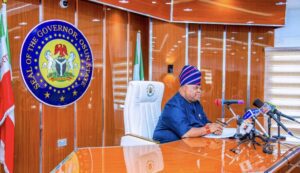


CBN raises interest rate to 26.75% to rein in inflation, stabilise naira
…External reserves hit 17-month high of $37bn, to boost investor confidence
…Nigeria’s capital importation hits $5.92 billion
…Implement fiscal policy measures to tackle inflation — CPPE to FG
…Pressure on Naira represents a clear risk to Nigeria’s policy rate — Economist
…Continuous hike in MPR remains a major challenge — Fmr CIBN Pres. Ajibola
By Seun Ibiyemi
In a move aimed at curbing rising inflation, the Central Bank of Nigeria (CBN) has raised its benchmark interest rate, the Monetary Policy Rate (MPR), to a record high of 26.75 percent.
This represents a 150 basis point increase from the previous rate of 24.75 percent, marking the third consecutive hike this year.
This represents a 50-basis point, lowest rate hike since February 2024 when inflation was 31.70 percent.
Asymmetric corridor was expanded to +500/-100 basis points, while the liquidity ratio was retained at 30 percent.
The cash reserve ratio (CRR) was retained at 45 percent for deposit money banks and at 14 percent for merchant banks.
After the two-day Monetary Policy Committee (MPC) meeting in Abuja which ended on Tuesday, Olayemi Cardoso, governor of the CBN, who announced the outcome of the meeting, said the members agreed to hold the parameters, other than the interest rate, unchanged
Most analysts had expected the CBN’s MPC to further hike the MPR following the rising inflationary pressure and the volatility in exchange rate.
This year, the MPC has aggressively implemented a cumulative rate hike of approximately 800 basis points since February 2024, alongside adjustments to other monetary tools, to combat rising inflation. In comparison, 2023 saw a total rate hike of 225 basis points.
At its recent meeting in May 2024, the committee increased the policy rate by 150 basis points to 26.25 percent, while keeping all other policy parameters unchanged.
“Given the MPC’s resolve to tame rising inflationary pressures, we expect the MPC to sustain its hawkish stance. Consequently, we expect the MPC to raise the MPR by 50 – 100 bps,” analysts at FBNQuest said.
Meanwhile, Nigeria’s external reserves have increased yet again, reaching $37.05 billion as of July 18, 2024.
This is according to the Governor of the Central Bank of Nigeria (CBN), Yemi Cardoso, at a press briefing at the end of the 296th Monetary Policy Committee (MPC) meeting in Abuja on Tuesday.
Cardoso noted that the external reserves rose from $34.70 billion as of the end of June 2024 to $37.05 billion, which is an increase of $2.35 billion in about 18 days.
The communique read by the CBN governor during the press briefing noted: “As of July 18, 2024, external reserves stood at US$37.05 billion, compared with US$34.70 billion as of June 2024. This represents eleven (11) months of import cover for goods and services.”
It was further observed that the foreign exchange (FX) reserves are at the highest level since January 26, 2023, when it was $37.07 billion. This means that the external reserves are currently at a 17-month high.
However, checks show that the CBN website puts gross reserves at $35.93 billion as of July 18, 2024, and $36.01 billion as of July 19, 2024, less than what the CBN governor presented.
Also, he disclosed that capital importation has risen to $5.92 billion between January and June 2024.
The total capital importation increased from $1.77 billion in the same period of 2023. This suggests an increase of 234% year-on-year.
”Capital importation between January and June, $5.92 billion relative to $1.77 billion for the corresponding period last year. That is all very positive for foreign exchange management.”
Based on the figures presented by the CBN governor, it appears that capital importation was $2.55 billion in the second quarter of 2024.
He added that inflows in the country have been on the rise.
He said, “On the foreign exchange side, because we all accept the fact that the foreign exchange pass-through is very significant, I am happy to say that we have seen positive outcomes from the tools we have been using over the recent past.
“For example, exchange rates have converged, limiting the opportunities for arbitrage. This is very important. Inflows have increased by 37.93 percent between January and May 2024 to $38.8 billion. Net inflows, more importantly, grew 73.4% in May 2024 compared to May 2023.”
Cardoso also disclosed that Diaspora remittances have gone up to $2.34 billion as of the end of June 2024 in comparison to $1.58 billion from the corresponding period last year.
…Pressure on Naira represents a clear risk to Nigeria’s policy rate – Economist
Reacting, the Managing Director, Chief Economist, Africa and Middle East Global Research for Standard Chartered Bank, Razia Khan has said pressure on the naira on both the official and parallel markets represents a clear risk to Nigeria’s policy rate.
“This is also a non-consensus view. The analyst consensus expects a 75 basis points (bps) rate hike to 27.0 percent at the July meeting. Against our expectation, June inflation quickened modestly to 34.2 percent y/y (34.0 percent in May), despite the base effect from Nigeria’s first fuel subsidy adjustment in June 2023,” she said.
…Implement fiscal policy measures to tackle inflation — CPPE
Also in swift response, the Centre for the Promotion of Private Enterprise (CPPE) says halting the interest rate hike is preferable due to the challenges businesses are facing.
The Chief executive officer (CEO) of CPPE, Muda Yusuf in a statement on Tuesday while responding to the outcome of the monetary policy committee (MPC) meeting of the CBN.
Yusuf said the moderate increase was tolerable and showed that the CBN was listening and responding to the suggestions of financial stakeholders to stop aggressive tightening measures.
However, Yusuf said he preferred a pause on interest rate increases because of the current challenges faced by businesses.
“The marginal increase marks a softening of the tightening stance. It is tolerable,” Yusuf said.
The CPPE boss also called for speedy implementation of fiscal policy measures to tackle inflation.
“Already, the economic stabilisation plan contains some laudable fiscal policy measures that could reduce production costs in the economy,” he said.
“It is also important and urgent for the government to adopt and quickly implement the recommendation of the presidential committee on fiscal and tax reforms on the customs duty exchange rate, which proposed N800 per dollar.”
Yusuf said the adoption of this recommendation would have a considerable impact on the cost of goods and services in the country.
Speaking to Nigerian NewsDirect, former President/Chairman of Council, Chartered Institute of Bankers of Nigeria, Professor Segun Ajibola has said “it is good that the MPC agreed now that cost elements such as electricity, pressure from food prices, etc are fueling inflation.
“One may ask, how is monetary tightening going to ease cost push inflation? Contractionary monetary policy is employed to curb excessive demand. If anything, the state of the economy today is such that the majority of the populace are not in a position to make effective demand for their basic needs.
“Where then is the demand pull inflation being attacked by contractionary policies?
“Also MPC in a flash notice, the pains of hike in interest rate would cause businesses. Where do we draw the line as high interest rate on its own pressurises production cost, market prices and inflation?
“The MPC did not fail to mention the need for synergy between monetary and fiscal management. Who will make that happen? How and when?
“The above points to one fact I have repeated severally: inflation management is a holistic task, and not much, if any, can be achieved if macro goals are pursued in silos. Continued hike in MPR without due consideration for growth, employment and other macro indices is like cutting one’s nose to spite one’s face,” Professor Ajibola noted.



